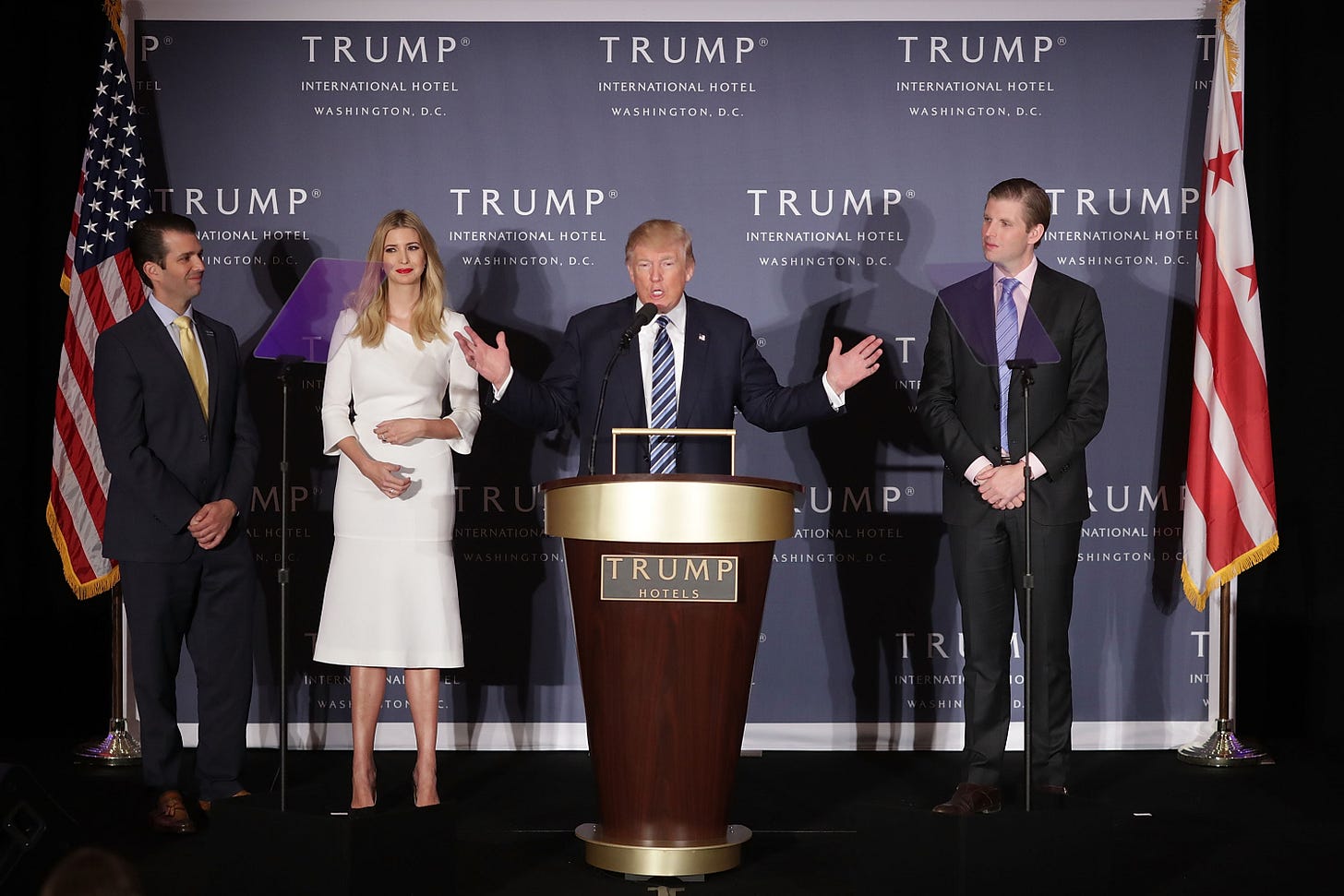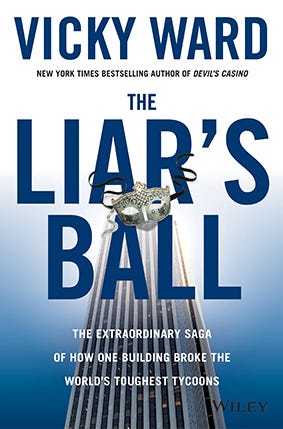Liars Fall?
What the Criminal History of Trump’s Former Right-Hand Man Could Tell Us About the New Lawsuit by the NY AG
Donald Trump and his children Donald Trump, Jr., Ivanka Trump, and Eric Trump during the grand opening ceremony of the Trump International Hotel October 26, 2016 in Washington, DC. All four of them are subjects of the lawsuit filed yesterday by New York State Attorney General Letitia James accusing them of massive fraud. (Photo by Chip Somodevilla/Getty Images)
For those who don’t have the time to sift through the 222-page lawsuit filed yesterday by New York State Attorney General Letitia James against Donald Trump, three of his children (Don Jr., Ivanka, and Eric) and the Trump Organization accusing them of massive fraud, perhaps the following excerpt from my 2014 book The Liar’s Ball will give you a flavor of the kind of behavior one of Trump’s most senior executives was engaged in decades ago.
This excerpt is about the alleged behavior of Abraham Wallach, who had a criminal record for petty thefts—and yet became Trump’s right hand (officially his executive vice president for acquisitions and finance) for twelve years, until, by his own admission, he started stealing again.
Following the publication of my book, Wallach denied the remarkable anecdote he’d told me (as you’ll read below) in which he slipped sleeping pills into a competitor’s drink during a long-haul flight so that he could read the contents of the competitor’s briefcase ahead of the upcoming meeting. Wallach told The Real Deal that I’d lifted the story from a memoir he had written—but that he himself had embellished and occasionally fabricated stories in the book in order to secure a publishing deal (which he did not get). “The key thing most publishers told me was, ‘You need to jazz up the book,’” Wallach told The Real Deal at the time. “So I started looking at what I could do to jazz it up.”
Hmm.
The trouble with that claim, other than its outlandishness, is that, given his criminal track record, my publishers and I took the unusual step of having Wallach sign two permission forms asserting that everything that was in the excerpt he agreed to did “not contain matter libelous or otherwise unlawful and you agree to indemnify and hold us, our assignees and our licensees harmless from all liability arising out of any actual or alleged breach of those warranties.”
I have those signed permission forms beside me as I type this. Wallach also told me this dramatic anecdote himself several times, in person and over the phone, only disputing what I reported post-publication.
When, back in 2014, I asked Trump if he was aware of Wallach’s alleged behavior, he told me: categorically “no.”
I reached out to Wallach last night to see how he felt so many years on about the AG’s complaint. I wondered, given how closely he worked with Trump (including on at least one building named in the complaint: 40 Wall St.) if he was one of the 65 people interviewed about the allegedly false valuations.
His response to me was basically, “Vicky, I’m surprised to hear from you. I wouldn’t give you the time of day.” Click.
So, a refresher, then from Chapter 7 of The Liar’s Ball, entitled “Donald Trump’s Bag Man.” As Wallach said himself, “I called it Alice in Wonderland because when you work in Donald’s office, everything that’s up is down. Everything that’s black is white. I became absolutely insane.”
It was typical of Wallach to be five steps ahead, worried about things Trump himself wasn’t concerned about.
Wallach was whip-smart and loyal to a fault, and therein lay the good and bad. There was nothing Wallach wouldn’t do to achieve success for Donald Trump.
When Trump had hired him in 1989, Wallach had had some brushes with the law, which, Trump knew nothing about. Wallach was gay and at times felt isolated. He confided this to Trump, who was always quick to defend him, telling him he did not care what his sexuality was. But, regardless, Wallach was prone to deep anxiety that, at times, got the better of him.
He told this author a tale from his past that he says he was far too ashamed to ever share with Trump. It played out during a long-haul flight.
In his own words:
“I called the airline prior to leaving New York and made sure that I would be seated next to [a competitor] . . .
The flight groaned on and I was not getting anything out of him. What to do? All I wanted was information that was in the head and briefcase of the guy sitting next to me.
He and I ordered a round of drinks but when they arrived he excused himself saying he wanted to stretch his legs. This was my opportunity; it was enough time to slip two sleeping pills into his drink.
He returned; we toasted and began to sip our drinks. I was extremely nervous. What I was doing was wrong, illegal. . .What if I gave him too many pills and, combined with the alcohol, he died or went into a coma? I was flipping out.
We continued our conversation and he ordered another drink. Shit, I thought one drink with sleeping pills was enough, but two drinks! In about 15 minutes, he was clearly drunk and said he was extremely sleepy. I got him some additional pillows, turned off his light, and asked the attendant to cover him with a blanket.
Within five minutes he was snoring away. . .
For the first five minutes I kept putting the palm of my hand over his nostrils to make sure he was still breathing.
Slowly and quietly I reached for his attaché case. Should I open it and review the papers while he slept next to me? What if he woke? The alternative was to take the attaché case to the bathroom where I would have ample light and could take notes. I chose the latter.
With his attaché case in hand, I carefully walked around him, entered the bathroom, and locked the door. I was so nervous that I had trouble opening the case, thinking at first that it was locked. It was not locked. Once opened, I began to read the documents and notes taken by him on yellow pads. . . .
I went back to see what condition he was in. He was fast asleep, still snoring. I went back to the bathroom and took notes of those items that I thought were important. . .
I went back to my seat, placed his attaché case where it had been, and began to monitor his condition. So long as he was snoring I knew he was alive, but what if he was in a coma?
Purposefully I pushed my leg against his to see if he would wake; he did, I apologized, and he fell back to sleep for another three hours.
I was a nervous wreck, tired, famished, and feeling very guilty for what I had done. On the other hand, the man sitting next to me was refreshed and said that he hadn’t had such a good sleep in a long time.”
***
Wallach had headed the real estate group at First Capital Advisors (FCA), a pension fund advisory firm, when he met Donald Trump in 1989. He had been asked by FCA to comment on “the state of Trump’s empire” for 30 minutes on The MacNeil/Lehrer Newshour on PBS. Wallach says he had protested that he didn’t know much about Trump and he didn’t want to do it, but his boss at FCA thought it would be good public relations.
“On the show I basically said if you go after too many properties at one time and pay too much money and have too little equity, and the market goes down, you are in trouble.”
His reward? Trump sued him for $250 million.
Then he dropped the case and asked for a meeting. Wallach was mystified. Trump called him directly. “Hey, I hear you’re wonderful. I hear you’re a real smart real estate guy. But instead of knocking me, we ought to work together.”
Thus began a working relationship that was to last 12 fruitful years.
***
Wallach would later say:
“When he first hired me, I didn’t feel comfortable calling him Donald, and I thought it was too formal to refer to him as Mr. Trump. So I called him ‘Boss.’ That continued for the 12 years we were together. Once he got to know me, he often referred to me as ‘Abela,’ which is Yiddish for Abe. It was a very endearing name that only my grandmother had ever called me.
“Going to work each day at the Trump Organization was, at least at first, a lot of fun. You never knew whom you would meet or how the day would unfold. I often walked into his office to find him schmoozing with Henry Kissinger, Sylvester Stallone, or some gorgeous model or Hollywood star. Norma Foederer, Donald’s top assistant advisor for many years, told me that former President Nixon often came to visit Donald after he moved to New York.”
***
Wallach was genuinely devoted to Trump, but the GM Building would turn out to be a breaking point for him. He was very disappointed that the building wasn’t throwing off more money. He had really wanted to build a two-story retail mall. When Trump suggested turning the property into an office condominium building, Wallach despaired. He felt they’d forgotten their original ideas; they would never make enough money in time.
He was exhausted.
“I started to have a drug habit. I needed outlets. I’m working 24 hours a day. I’m on the phone at 4:00 in the morning . . .”
He says he began stealing credit cards.
When he was caught, Trump was gentle. He told him to stop stealing immediately, and to get treatment.
But Wallach couldn’t fix himself easily.
“You can’t stop an addiction. It continued until finally I said, ‘I’ve got to leave and restore my sanity.’ Donald agreed, and I asked him not to tell anybody. I said, ‘Donald, here’s the deal. You’re going to give me a year’s salary. I’m leaving and you’re not to say anything to anybody about what happened.’”
Trump reflected: “I’m surprised he volunteered all that. But yes, I was very good to him—and I needn’t have been. I liked Abe.”





